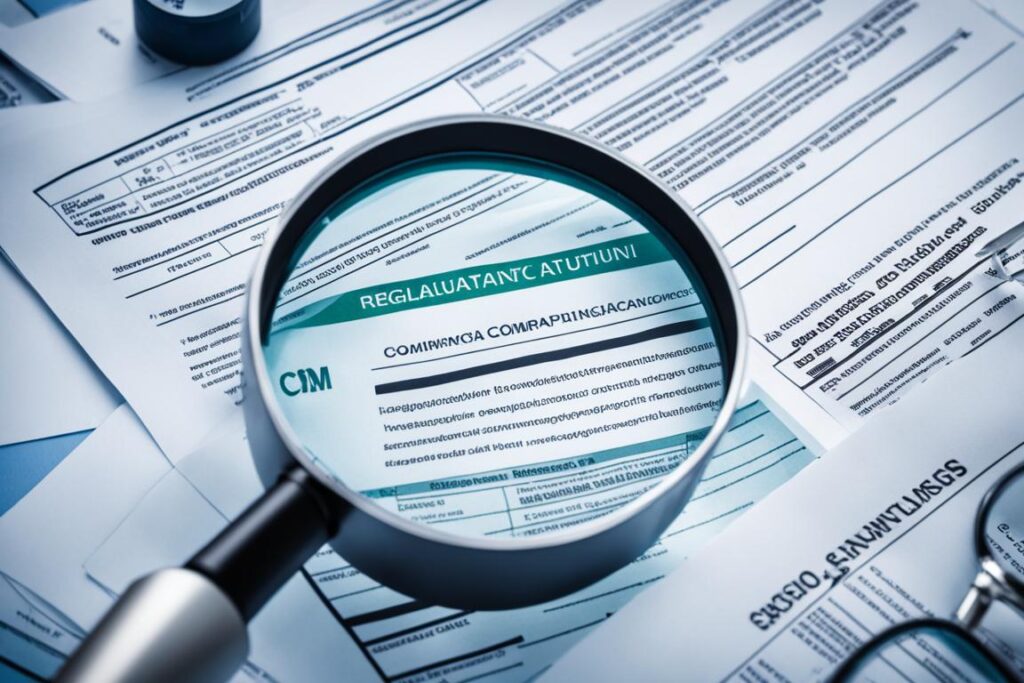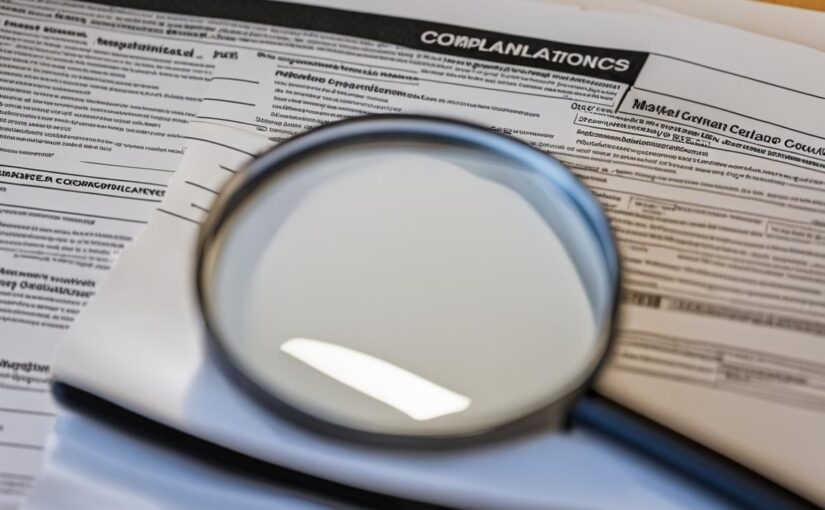With businesses in Romania subject to an array of regulatory requirements, staying compliant with the latest standards can be challenging. Regulatory compliance audits can help ensure that businesses align with these requirements and minimize the risk of non-compliance penalties.
Through this article, we will explore the importance of regulatory compliance audits for businesses in Romania and demystify the audit process to help navigate regulatory compliance audits with ease. We’ll provide insights into the role of regulatory compliance audits in ensuring compliance, guidance on maintaining regulatory compliance, and tips for successfully navigating the audit process.
Key Takeaways
- Regulatory compliance audits are essential for businesses in Romania to ensure compliance with regulatory requirements.
- Assessing regulatory requirements and understanding compliance standards are crucial steps in preparing for regulatory compliance audits.
- Engaging professional audit services can provide businesses with the expertise and experience needed to conduct successful audits.
- The audit process involves planning, fieldwork, and reporting stages, and identifying and addressing any non-compliance issues.
- Maintaining regulatory compliance requires ongoing compliance monitoring and staying up-to-date with regulatory changes.
Understanding Regulatory Compliance Audits
Regulatory compliance audits are an essential part of doing business in Romania. These audits are designed to assess a company’s compliance with regulatory standards relating to their products or services. By conducting these audits, businesses can identify areas of non-compliance and take remedial action to ensure that they meet all required regulatory standards.
There are different types of regulatory compliance audits businesses can engage in. These include compliance audits and regulatory audits. Both types of audits are essential and should be conducted regularly to ensure ongoing compliance. Engaging professional audit services is indispensable to achieve a thorough assessment of your company’s regulatory compliance.
Professional audit services bring knowledge and expertise and can provide an independent assessment that is objective and unbiased. They can also identify potential areas of risk and provide recommendations to mitigate them. Businesses in Romania should prioritize regulatory compliance audits and the use of professional audit services to ensure compliance with regulatory standards.
Assessing Regulatory Requirements
Assessing regulatory requirements is an essential part of ensuring compliance for businesses in Romania. Conducting a comprehensive compliance assessment helps identify any gaps or areas of non-compliance. By doing so, it gives companies a better understanding of the regulatory requirements relevant to their operations.
When conducting compliance assessments, businesses should consider their industry-specific regulatory requirements. For instance, if a business operates in the financial industry, it should comply with relevant financial regulations in addition to general business regulatory requirements.
Compliance assessments should cover all areas of the business, including operations, accounting, finance, human resources, and IT, among others. Businesses should also engage with professional auditors who understand the regulatory requirements specific to the industry in which the business operates. Professional auditors can help businesses identify potential compliance gaps and recommend remediation strategies.

“Conducting a comprehensive compliance assessment helps identify any gaps or areas of non-compliance.”
By conducting regular compliance assessments, businesses can also stay up-to-date with any regulatory changes that are relevant to their operations. They can adjust their operations to meet new regulatory requirements as and when they are introduced.
It is important to note that compliance assessments are not a one-time event, and businesses should plan to conduct them regularly. By doing so, businesses can maintain compliance and avoid penalties for non-compliance.
Understanding Compliance Standards
For businesses in Romania, adhering to compliance standards and regulatory guidelines is essential. These standards ensure that businesses operate in a safe, legal, and ethical manner, protecting both employees and consumers. Compliance standards can vary depending on the industry, so it’s vital for businesses to understand how they apply to their specific operations.
Key compliance standards in Romania include environmental regulations, labor laws, consumer protection laws, and data privacy regulations. Understanding these standards and how they apply to different business activities is crucial for avoiding penalties and fines.
Moreover, compliance standards are not static – they can change frequently, particularly at the regulatory level. Keeping up-to-date with these changes is therefore critical to maintaining compliance. Businesses should work with trusted advisors to monitor regulatory compliance guidelines and adjust their operations accordingly.
The Role of Regulatory Compliance Audits
Regulatory compliance audits play a critical role in ensuring businesses operating in Romania meet regulatory standards. These audits evaluate a company’s compliance with established legal requirements and industry standards. Engaging professional audit services can provide an independent assessment of compliance, helping companies identify and rectify any compliance issues before they become major problems.
By conducting regular regulatory compliance audits, companies can proactively identify areas of non-compliance and develop effective remediation plans. This ensures that businesses are able to address any issues before they escalate and lead to potential penalties, liability, and reputational damage.
Ultimately, regulatory compliance audits are an essential tool for mitigating risks and ensuring ongoing compliance with regulatory requirements in Romania.

Preparing for Regulatory Compliance Audits
Preparing for regulatory compliance audits can be daunting, but it doesn’t have to be. Conducting regular compliance assessments is key to identifying potential issues and implementing internal controls to mitigate risks.
One strategy businesses in Romania can adopt is establishing an audit readiness plan that outlines the steps to take in preparation for an audit. This plan should include a comprehensive review of policies, procedures, and internal controls.
It’s also important to ensure that all relevant stakeholders are aware of the audit process and their role in it. This can be done through training sessions or regular communication updates.
Leveraging technology can also streamline the audit process. Using audit management software, businesses can automate tasks, create reports, and improve overall efficiency.
Ultimately, preparing for regulatory compliance audits requires a proactive approach. By conducting regular compliance assessments, establishing internal controls, and leveraging technology, businesses in Romania can navigate the audit process with greater ease and confidence.
Engaging Professional Audit Services
While regulatory compliance audits are an essential part of ensuring that your business meets all regulatory standards, it can be challenging to conduct them internally. Hiring professional audit services can provide several advantages and benefits for businesses in Romania.
Expertise and Experience
Professional audit firms have a team of experts who are well-versed in regulatory compliance audits. They have the knowledge and experience to ensure that your business meets all the regulatory requirements applicable to your industry. Auditors also stay up-to-date with the latest regulatory changes and can help you develop and implement strategies to address any compliance issues.
Independent Assessment
Another benefit of engaging professional audit services is that auditors provide an independent assessment of your business’s compliance. This independence brings credibility to the process and ensures that your business is meeting all the regulatory standards impartially. It also provides a fresh perspective on your company’s operations and can help identify compliance gaps that may have been overlooked internally.
Customized Audit Services
Professional audit firms can provide customized audit services to meet the unique needs of your business. They can tailor their audit methodology to your industry, company size, and operations, ensuring that you receive an audit that is relevant and effective. Additionally, these firms can provide advisory services and support your management team in developing and implementing remediation plans.
Engaging a professional audit firm can provide numerous benefits and ensure that your business meets all regulatory standards. The expertise and experience of auditors, along with the independence and customized services they provide, can give you peace of mind that your business is well-protected and compliant.
Conducting the Audit Process
Regulatory audits are a critical aspect of ensuring compliance with regulatory standards for businesses in Romania. Conducting the audit process helps businesses identify any non-compliance issues and take corrective actions to mitigate risks.
The audit process typically involves three stages: planning, fieldwork, and reporting. During the planning stage, auditors will gather information about the business, its operations, and its regulatory obligations. This information will be used to design an audit plan that focuses on areas of high risk.
The fieldwork stage involves testing the compliance of various processes and controls against the regulatory requirements. This stage can involve interviews with staff members and reviewing documentation such as contracts and policies.
Once the fieldwork is complete, auditors will prepare a report of their findings. The report will include details of any non-compliance issues identified, as well as recommendations for corrective actions to mitigate risks.
Businesses should approach the audit process with an open mind, cooperatively working with auditors to ensure a successful audit. By taking the process seriously and working to address any issues, businesses can ensure they are meeting their regulatory requirements and mitigating risks.
Addressing Non-Compliance Issues

While undergoing regulatory compliance audits, non-compliance issues can be identified. In such cases, it is important for businesses in Romania to take appropriate remedial actions and devise a plan to address the issue. This plan for dealing with non-compliance issues should be aligned with the results of compliance assessments, regulatory compliance guidelines, and other related standards.
Remediation plans should target all identified non-compliance issues and create a detailed framework to correct them. Ongoing monitoring and regular compliance assessments can prevent further breaches of regulatory standards, while identifying and correcting new compliance gaps. Such accuracy plays a crucial role in ensuring compliance standards are always met, thereby reducing the risk of future regulatory compliance issues.
Maintaining Regulatory Compliance
Staying compliant with ever-changing regulatory guidelines in Romania can be a challenging task. However, maintaining regulatory compliance is crucial for businesses to avoid legal consequences and reputational damage. Beyond passing regulatory compliance audits, consistent monitoring and staying aware of the latest compliance standards are essential for keeping compliance in check.
One way that businesses can ensure ongoing compliance is by frequently reviewing their internal controls and compliance procedures. This gives them a chance to identify potential compliance gaps and fix them before they lead to non-compliance issues. Additionally, they should consider hiring experienced auditors to conduct periodic compliance assessments.
Staying up-to-date with regulatory changes is also crucial to maintaining compliance. Businesses should make a habit of regularly reviewing relevant regulatory publications. This will ensure that they remain informed of any new or upcoming changes that may affect their operations.
By keeping tabs on their regulatory compliance, businesses in Romania can stay ahead of any surprises. Ultimately, prioritizing regulatory compliance is an investment in avoiding costly legal repercussions, maintaining stakeholder trust, and promoting long-term success.
Ensuring Success with Regulatory Compliance Audits
Conducting successful regulatory compliance audits is crucial for businesses in Romania, and there are several tips and strategies they can leverage to achieve this.
Foster a Culture of Compliance
One of the most effective ways to ensure successful regulatory compliance audits is by fostering a culture of compliance within the organization. This entails creating an environment where compliance is seen as a company-wide responsibility and not just the job of a few individuals.
Employees should be trained on regulatory compliance standards and encouraged to report any potential violations. Additionally, compliance should be incorporated into the organization’s core values and business strategy to create a culture that prioritizes compliance.
Leverage Technology
Technology can be a valuable tool in streamlining the audit process and ensuring compliance. Investing in audit management software can help businesses in Romania to track compliance and manage audit processes more efficiently. This can include recording and analyzing audit data, generating automated reports and analysis, and compiling compliance documents.
Furthermore, technology can be used to improve communication between different business functions, leading to more effective collaboration and identification of potential compliance issues.
Engage Professional Audit Services
Businesses can also ensure successful regulatory compliance audits through engaging professional audit services. Experienced auditors can bring a fresh perspective and provide an independent assessment of the organization’s compliance status.
They can also provide valuable insights and recommendations on improving compliance processes and identifying compliance gaps. In addition, engaging audit services can save businesses in Romania time and resources compared to conducting audits in-house.
By fostering a culture of compliance, leveraging technology, and engaging professional audit services, businesses in Romania can achieve successful regulatory compliance audits and ensure ongoing compliance with regulatory standards.






